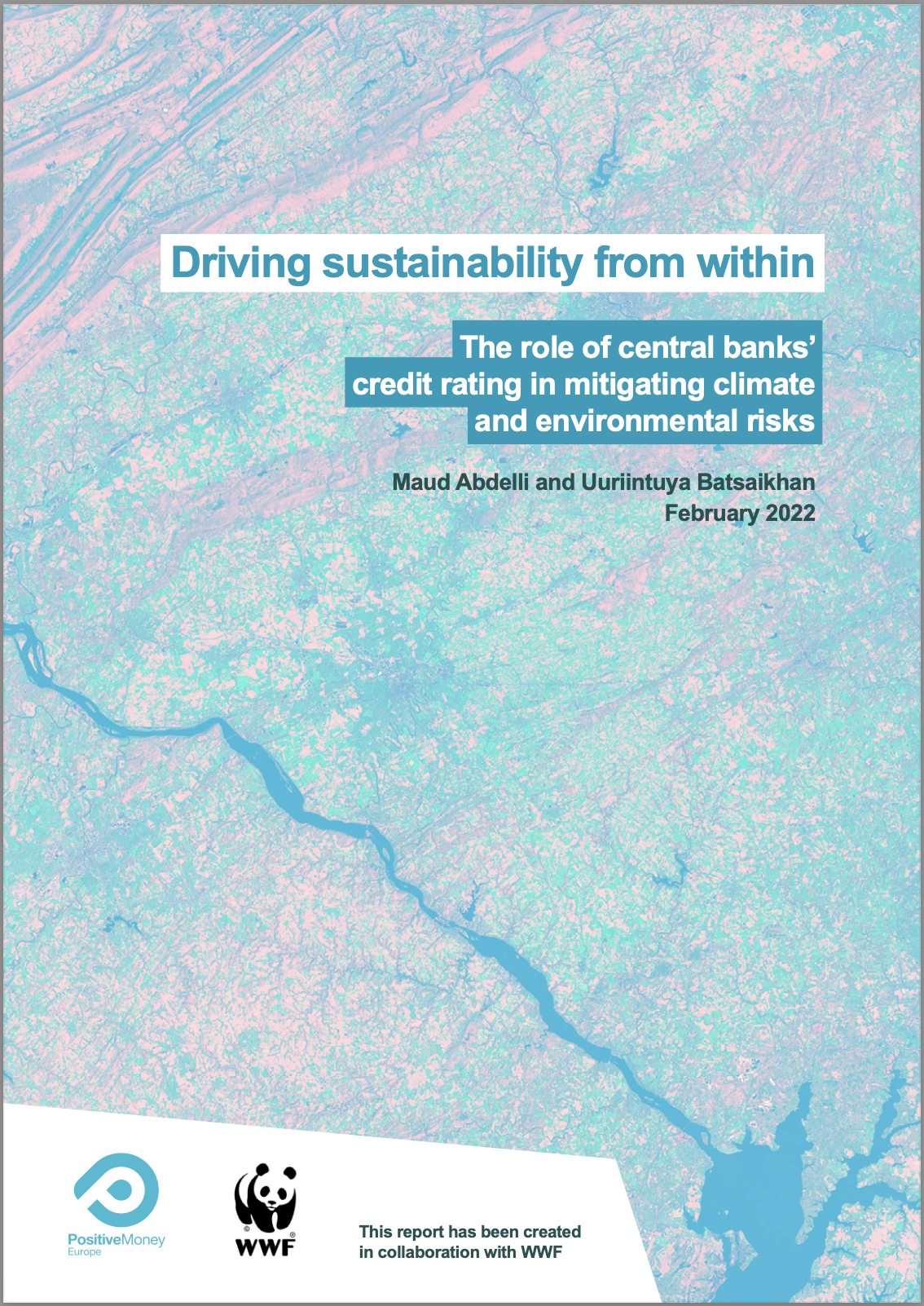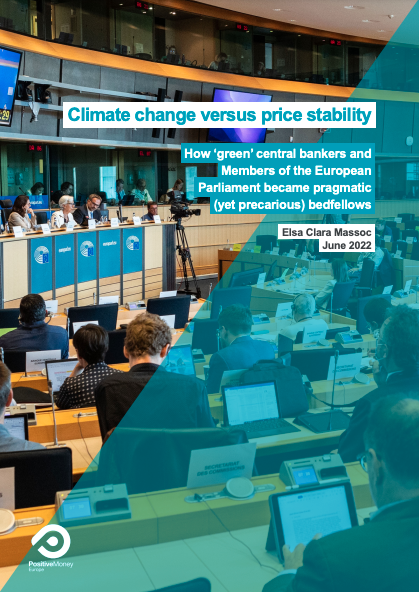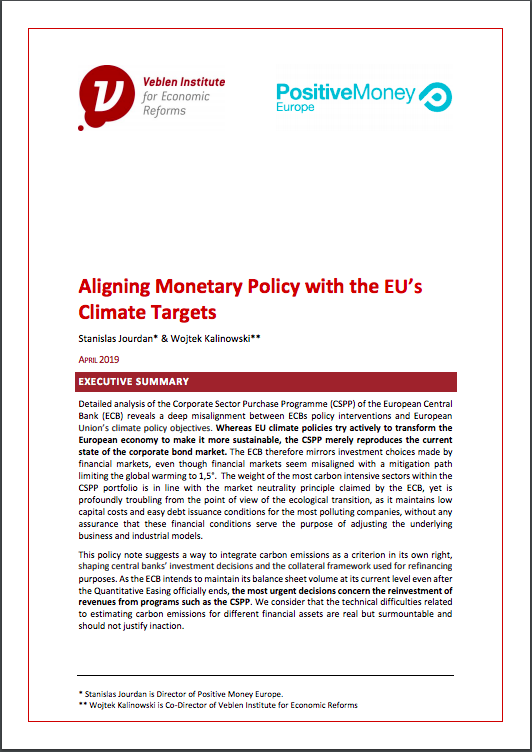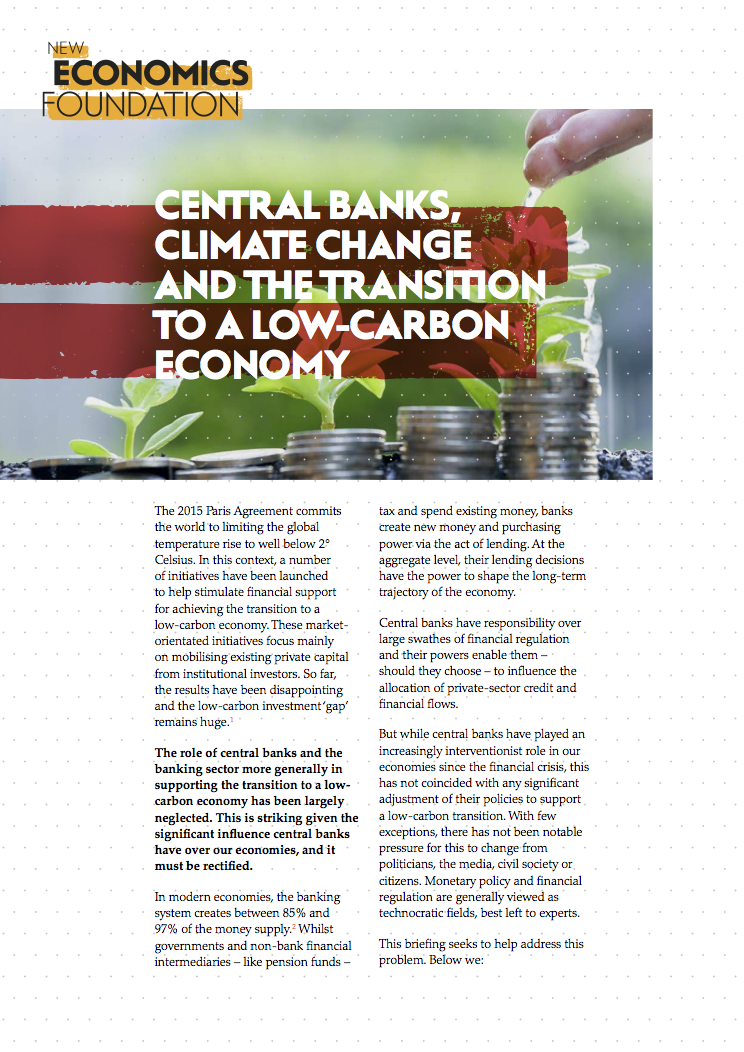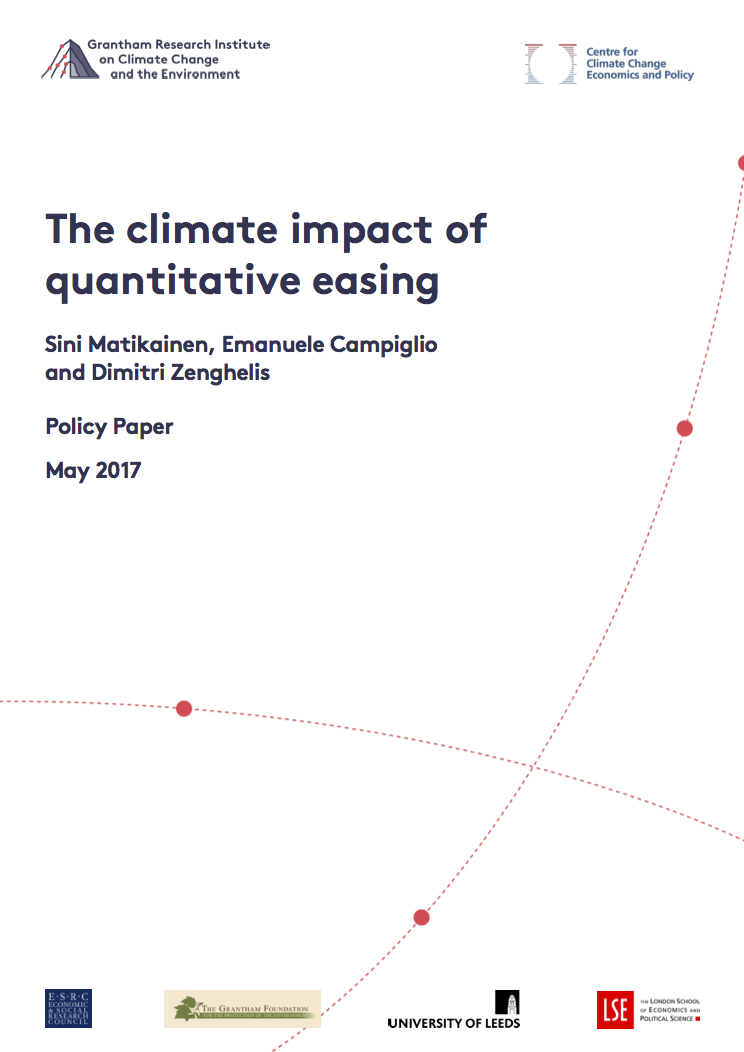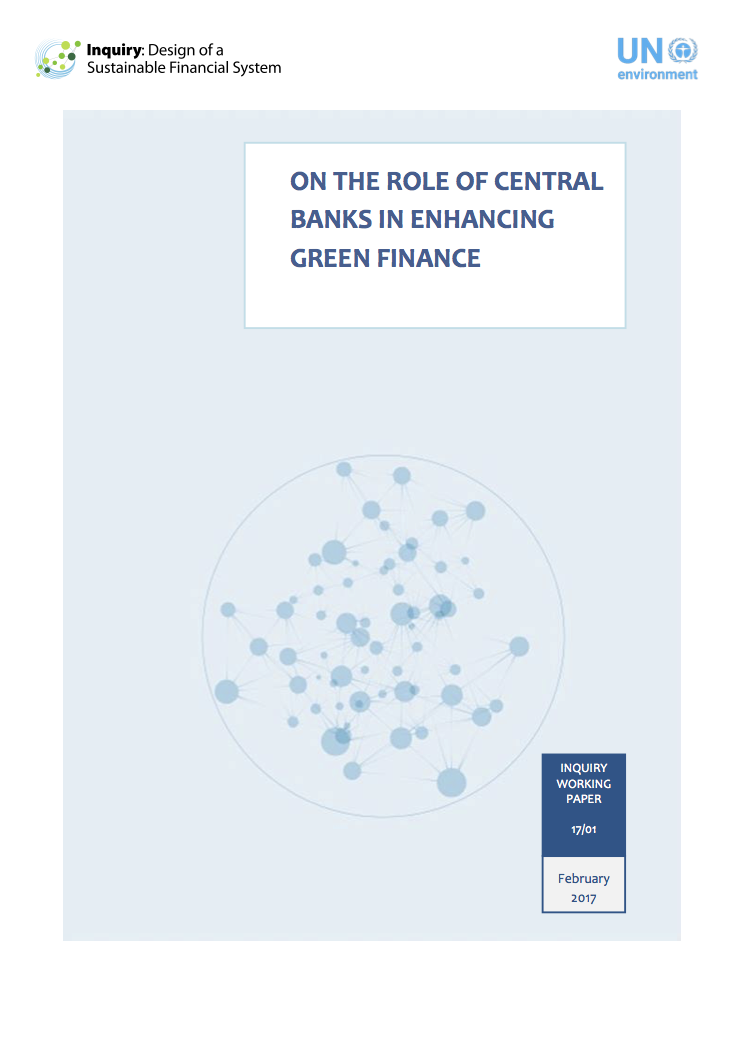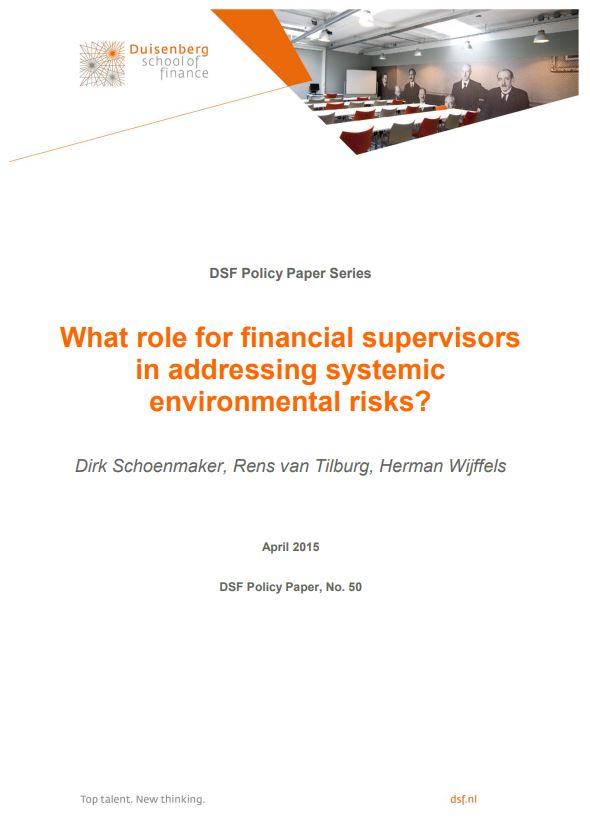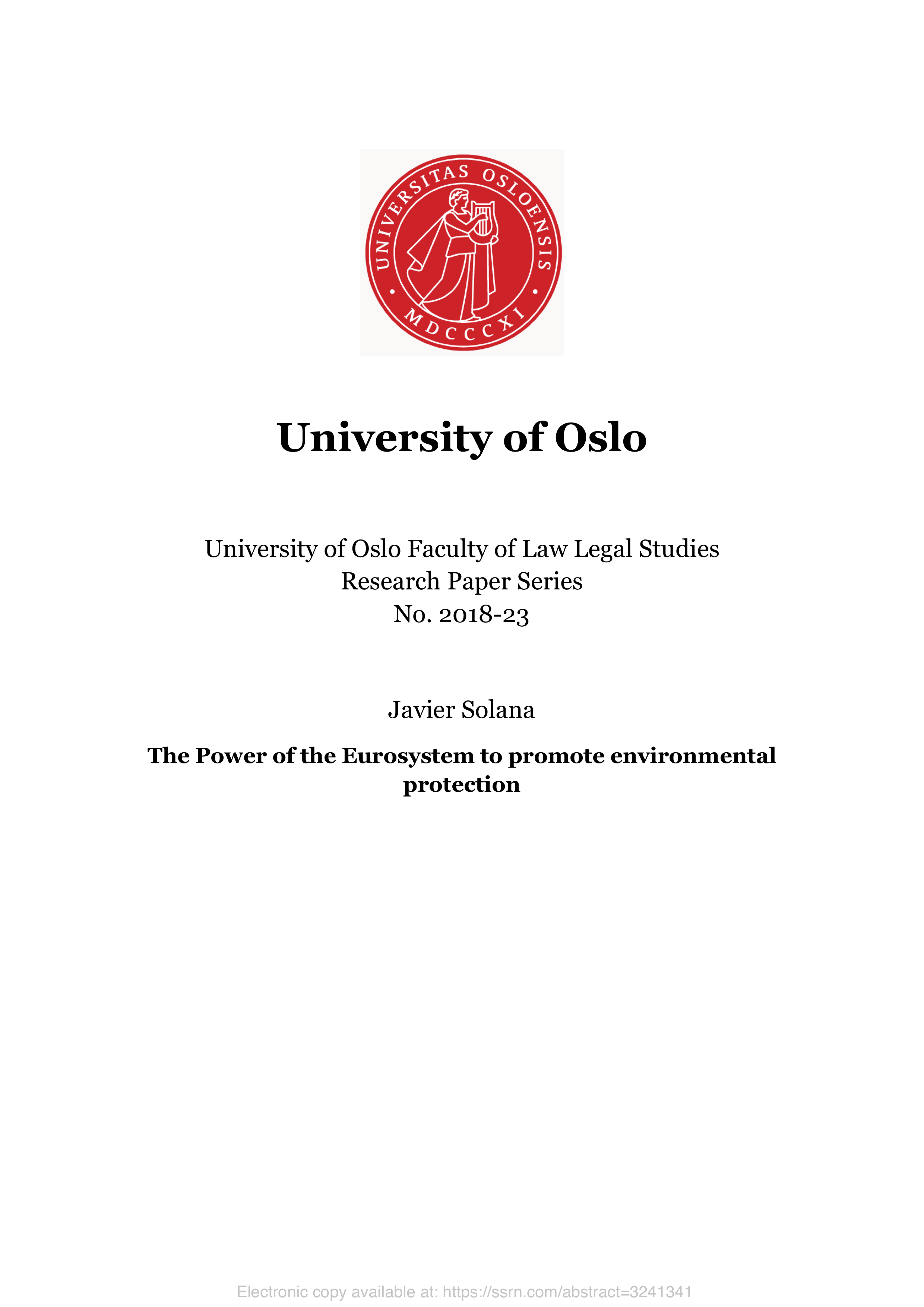Green monetary policy and sustainable finance

Addressing the threat of climate change requires a major shift in how financial resources are allocated. Unfortunately, lack of financial regulation and inaction by central banks enable both banks and investors to continue investing in fossil fuel industries, instead of prioritising investments in the green transition. Financial authorities such as central banks need to deploy all the tools that they have to align financial flows with the EU’s commitment to fight climate change.
In 2015, the European Union (EU) signed the Paris Agreement on climate change, thus committing itself to align financial flows with goals to tackle this pressing issue. Despite this, investors and banks continue to invest massively in polluting activities, such as fossil fuel extraction, because it brings them short-term profits. This is what economists call the ‘tragedy of the horizon’: the financial sector’s profit-seeking nature means that it tends to focus blindly on short-term horizons, while society needs to focus on long-term sustainability.
Continuing on this path is unsustainable, not only for the planet but also for the financial system itself. There is a growing consensus that investments in fossil fuel activities will eventually become ‘stranded assets’, meaning that they will lose their value as society eventually shifts towards green energy production. As the financial sector invests trillions in fossil fuels, the cost of stranded assets could become huge and cause a systemic failure of the financial system, costing billions in taxpayers’ money as banks will eventually need to be bailed out.
Changing this state of affairs starts by recognising that profit-seeking banks and financial markets will not change by themselves. Public authorities must intervene to change their behaviour.
The European Central Bank (ECB) sits at the top of the entire Eurozone financial system. It has powerful — but unexploited — tools to make banks and investors shift trillions of euros towards the green transition. However, they are unwilling to do so, because they believe they should follow the principle of ‘market neutrality’. In other words, they believe that they should not shape the allocation of money in the economy. By blindly following this principle, the ECB has made the problem worse by directly lending nearly €385 billion to the most polluting firms under the so-called ‘quantitative easing’ programme.
Positive Money Europe’s work aims to ensure that the ECB and national central banks in the Eurozone align their policies with the EU’s environmental commitments. They should use all the tools they have to guide the financial system towards a greener economy.
Our victories so far
Since 2018, we have been coordinating a large coalition of civil society organisations, experts, activists and politicians, in order to challenge the ECB’s inaction on climate change.
In 2019, we rallied an unprecedented number of NGOs and experts, calling on the ECB to take action on climate change. Following our call, we met with the ECB’s new president Christine Lagarde, and she later announced that the ECB would start a ‘strategic review’ to assess how it could contribute to the fight against climate change. However, it was clear from the beginning that a lot of pressure would be needed in order to ensure that the ECB’s top decision-making body — the Governing Council — would take concrete steps.
We started mobilising thousands of citizens to pressure the ECB directly. Nearly 170,000 citizens signed a petition, and grassroot groups took direct actions in front of the ECB and national central banks. And thanks to our work, the European Parliament has repeatedly passed resolutions calling on the ECB to adopt green monetary policy. Although the ECB is independent, they have to explain their decisions to democratic bodies such as the European Parliament.
In July 2021, our efforts eventually paid off when the ECB announced an action plan to tackle climate change. As a result, the central bank is now implementing some of Positive Money Europe’s long-standing demands, such as the inclusion of climate factors into their Corporate Bond Purchases Programme (CSPP). This means that, in practice, the ECB is now moving away from its market neutrality ideology.
Next steps: moving from reactive to proactive green monetary policy
A paradigm shift is taking place within the central bank community. However, the ECB’s approach remains too narrowly centred on the impact of climate change on the stability of the financial system, and not on the impact of the financial system on climate change (what we call ‘double materiality’). The double materiality principle requires the adoption of proactive measures to change how banks and investors allocate money in the economy.
Positive Money Europe continues to work tirelessly to accelerate the ECB’s action plan by researching and campaigning for more ambitious actions. Our vision of a green ECB is underpinned by the following four pillars:
FOLLOW US
Latest news on sustainable finance
Implications of the ECB’s new operational framework for the green transition
On Wednesday March 13, 2024, the European Central Bank (ECB) announced changes to its operational framework, the toolbox it uses to implement its monetary policy. Think of it like the control panel of a car, with the ECB adjusting the settings (interest rates) to keep the car (financial conditions and prices) running smoothly. The operational framework relates to how the ECB adjusts these settings, which is to say the mechanisms by which it sets interest rates.
Navigating the flood: the critical need for climate risk disclosure in adapting to climate change
Basel Committee sets the stage for deeper scrutiny of climate-related financial risks
1. DECARBONISING QUANTITATIVE EASING

As part of its quantitative easing (QE) programmes, the ECB has injected more than 385 billion euros into corporate bonds. Many studies (including by Positive Money Europe) have shown that the ECB invests the bulk of this money in the multinational companies that contribute the most to climate change.
In October 2022, and following our demand, the ECB started to reduce their holdings of corporate bonds from the dirtiest companies. However, their progress has been slow, and their framework for doing so is not transparent enough. The ECB should go further by fully excluding the most polluting companies from its corporate bond portfolios.
2. GREENING THE ECB’S COLLATERAL FRAMEWORK
The ‘collateral framework’ is the ECB’s rulebook that defines which financial assets banks can use to obtain liquidity from the central bank. The ECB’s collateral framework is thus a powerful mechanism that can shape the behaviour of the wider financial market.
By limiting or excluding certain assets (e.g. corporate bonds from fossil fuel industries) from the ECB’s collateral framework, the ECB would effectively make these assets less liquid and less attractive for financial markets, thus disincentivising banks to issue such assets in the first place.
By modifying the collateral framework’s eligibility criteria, and excluding companies that are not climate aligned and do not have green transition plans, the ECB can steer the financial market towards more sustainable activities.
The ECB has announced that it will start greening its collateral framework in 2024, but so far, no visible progress has been made. A big concern is that they will eventually rely on unreliable ESG ratings agencies to assess the green credentials of corporations. Instead of relying on private agencies, Positive Money Europe advocates for central banks to use and develop in-house credit assessment systems that incorporate environmental risk metrics. We are actively engaging with central banks to explore how this can be done in practice.

3. GREEN-TARGETED LENDING OPERATIONS
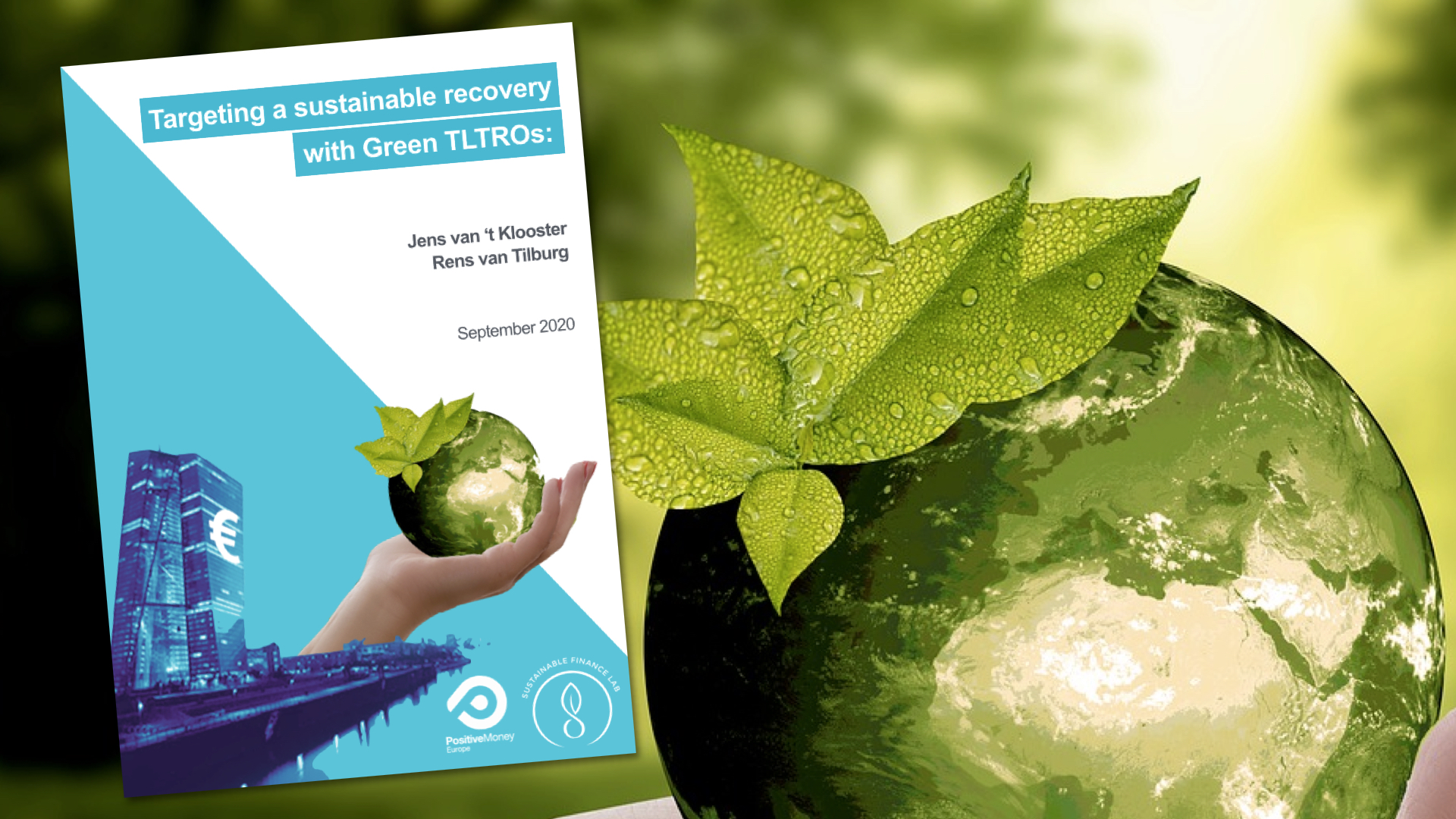
While greening the collateral framework can help encourage banks to reduce lending associated with harmful and polluting activities, there remains a significant risk that banks do not provide enough money for activities that directly support the transition to a sustainable economy.
In times of inflation, the ECB further exacerbates this by increasing interest rates, which, in turn, risks making green investments even more costly, and contradicts the EU’s efforts to accelerate the green transition.
The ECB’s interest rate policy follows a ‘one-size-fits-all approach’ by applying the same level of interest rate on loans regardless of the social and environmental impact of the investments made with those loans. Since 2020, Positive Money Europe has been championing a proposal to adopt a ‘green dual rate’ when lending money to banks. This would see the ECB applying a lower interest rate for green lending activities in order to incentivise banks to offer loans to people and companies that are aligned with the EU’s climate ambitions.
As a proof of concept, Positive Money Europe advocates for the introduction of a lower interest rate targeted to loans for energy efficiency renovation purposes. Renovating millions of buildings is one of the highest priorities of the EU’s Green Deal strategy. But right now, most people cannot afford to renovate their homes because the financial products offered by banks are inadequate and too expensive. The ECB could make a big difference by lowering the cost of these loans.
Together with dozens of partners across Europe, we launched a dedicated campaign in 2022 to push central banks and governments to implement this proposal.
4. ENSURING A GREEN AND JUST TRANSITION
The green transition will not be an easy journey. The transition away from fossil fuels and the impacts of climate change will exert price pressures on those that are most vulnerable in society. It will also require retraining millions of workers into new jobs in more sustainable sectors. Governments must prevent and mitigate the risk of rising inequality by developing redistribution mechanisms and increasing support for training, education and other social policies.
Positive Money Europe advocates for more coordination between fiscal and monetary policy, for example, by allowing the ECB to directly finance EU-level bonds (such as those issued by the European Investment Bank or the EU’s Next Generation programme) to ensure that the EU and national governments can spend as much as is needed for a fair and just transition for all.
Further resources
How to stop the wild green gold rush: Credible ESG ratings (February 2023)
The market for environmental, social and governance (ESG) rating and data is expected to grow immensely in the next decades. This brief zooms in both on the integration of ESG risks into “traditional” operations of Credit Rating Agencies (CRAs) as well as on the emergence of a market exclusively dedicated to ESG rating. As will become clear, the market for ESG ratings suffers from serious shortcomings, a lack of transparency and standardisation, significant biases and conflicts of interests, and a dependence on large, oligopolistic, credit rating agencies.
Driving Sustainability From Within: The role of central banks' credit rating in mitigating climate and environmental risk (February 2022)
This report proposes expanding the role of Eurosystem’s own internal credit assessment systems, the so-called ICASs, to integrate climate and environmental risks. We see the increasing role and potential of C&E risk integration into ICASs as a concrete, workable and impactful way to green the collateral framework.
Climate change versus price stability: How ‘green’ central bankers and Members of the European Parliament became pragmatic (yet precarious) bedfellows (June 2022)
This study traces how climate change became a topic in Europe’s monetary policy. Utilising a novel and extensive dataset, it shows how the European Parliament, early on, called for a greener monetary policy and eventually allied with members of the ECB to forge a consensus on monetary policy and climate change.
Money looking for a home: how to make the ECB's negative interest rates pay for building renovations (February 2021)
This policy paper proposes to turn the European Central Bank’s Targeted Longer-Term Refinancing Operations (TLTROs) programme into a dedicated financial instrument to scale up bank loans for energy efficiency and building renovations.
With its “Renovation Wave” initiative, the European Commission has rightly identified improving the energy efficiency of buildings through renovations as a key priority for the EU’s climate strategy. However, without scalable financial firepower, the European Commission is doomed to disappoint on its ambition to double the pace of building renovation by 2030.
Targeting a sustainable recovery with Green TLTROs (2020)
The EU today faces two dramatic challenges: the COVID-19 Pandemic and the climate transition. The EU’s recovery plan for the pandemic falls far short of the estimated €2 trillion needed for achieving a sustainable recovery in line with the EU’s environmental objectives.
This report from Positive Money Europe and the Sustainable Finance Lab explains how the European Central Bank can incentivize private banks to lend more money for green investments. By tweaking its Targeted Longer-Term Refinancing Operations (TLTROs) programme, the ECB could make green lending much more affordable for small businesses and households.
The ECB and climate change: outlining a vision for success (2020)
The EU economy urgently requires innovative and bold reforms that reshape finance, so that it can help sustain our planet and enable us to thrive.
In this policy briefing, co-written with the New Economics Foundation and 350.org, we offer policymakers a list of recommendations that, if implemented by the ECB, would constitute a successful strategic review from a climate justice perspective.
Aligning monetary policy with the European Union's climate targets (2019)
This analysis of the European Central Bank’s corporate bonds portfolio reveals a worrying gap between the ECB’s quantitative easing programme and the European Union’s climate objectives.
This report, co-written by Stanislas Jourdan (Positive Money Europe) and Wojtek Kalinowski (Veblen Institute), includes an exclusive analysis of the corporate-sector purchase programme (CSPP) by the European Central Bank (ECB). The report was originally published in French (here).
Central Banks, Climate Change and the Transition to a Low-Carbon Economy (New Economics Foundation - 2017)
While central banks have played an increasingly interventionist role in our economies since the financial crisis, this has not coincided with any significant adjustment of their policies to support a low-carbon transition.
This briefing explain how central banks should play a more prominent role in supporting a low-carbon transition rather than maintain the status quo; the authors also identify some policy interventions that could help central banks address the growing challenges of climate change. In particular, they recommend a green macroprudential policy approach, green credit allocation interventions, and greening central bank balance sheets (also known as ‘Green QE’).
The Climate impact of Quantitative Easing (LSE - Grantham Institute - 2017)
Both climate change and the low-carbon transition are likely to have deep implications for the functioning and stability of the macro financial system. The discussion of possible risks has largely focused on the private sector; however, this paper argues that central banks should also consider how their operation of monetary policy could affect the transition to a low-carbon economy. Even supposedly market-neutral interventions by central banks may show an unintended structural bias towards carbon-intensive industry incumbents.
The role of central banks in enhancing Green finance (UNEP - 2017)
The paper examines the role of central banks in ‘greening’ financial systems. Given the enormous investment needed to bring about a green transformation, the financial sector will have to play a central role in allocating resources towards a sustainable and green economy – and stop financing activities that harm the environment. Against this backdrop, the paper examines the extent to which environmental factors impinge on central banks’ conventional goals and provides a theoretical analysis of the cases for and against central banks to respond to environmental and sustainability challenges. Moreover, the paper explores the ways in which central banks (as well as financial regulatory authorities) can impact investment decisions and the creation and allocation of credit through monetary as well as micro- and macroprudential policies.
What Role for Financial Supervisors in Addressing Systemic Environmental Risks? (DSF - 2015)
Since the global financial crisis, financial supervisors have developed a new macroprudential policy framework to identify systemic financial imbalances and address these. At the same time, a literature is rapidly developing on financial shocks that may originate from ecological imbalances and climate related risk (physical, transition and liability risks).
However, financial supervisors have so far given little attention to this ecological dimension. This allows systemic financial imbalances resulting from ecological pressures to build up and concentrate in financial institutions and markets. This paper sketches the ecological dimension of the macroprudential policy framework and illustrates the working for the case of carbon emissions.
The Power of the Eurosystem to promote environmental protection
The misalignment of the Corporate Sector Purchase Programme (CSPP) with the EU’s environmental commitments has stirred a lot of political debate in recent months. This essay puts forward the argument that the Eurosystem is bound by article 11 TFEU to integrate environmental objectives into the mandate of the Eurosystem. On this basis, the essay provides a critical analysis of the validity of the controversial CSPP.
Sign up to our emails
We promise never to sell or swap your details and you can change your preferences at any time. To do so, simply call +32 2 880 04 34 or email info@positivemoney.eu
FOLLOW US
Latest news on sustainable finance

Implications of the ECB’s new operational framework for the green transition
On Wednesday March 13, 2024, the European Central Bank (ECB) announced changes to its operational framework, the toolbox it uses to implement its monetary policy. Think of it like the control panel of a car, with the ECB adjusting the settings (interest rates) to keep the car (financial conditions and prices) running smoothly. The operational framework relates to how the ECB adjusts these settings, which is to say the mechanisms by which it sets interest rates.

Navigating the flood: the critical need for climate risk disclosure in adapting to climate change
Basel Committee sets the stage for deeper scrutiny of climate-related financial risks





